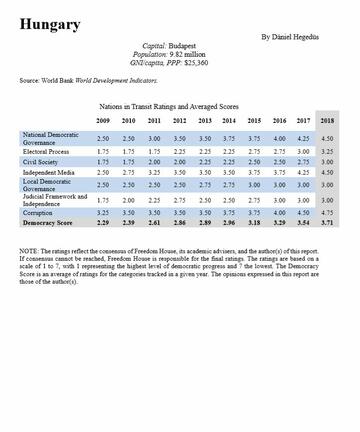
Related contents
Nations in Transit 2018 – Slovenia Country reportNations in Transit 2018 - Romania Country Report
The general trend observed in the country during 2017 is a worrying drop in all the analysed fields, resulting in the decline of Hungary’s Democratic Score from 3.54 to 3.71.
In fact, through the adoption of measures like the ‘Lex CEU’, the ‘Billboard Law’, the ‘Lex NGO’, and the related anti-NGO and ‘anti-Soros’ campaigns, the Hungarian government led by Viktor Orbán has shown increasing authoritarian tendencies. Among others, the report highlighted the following concerning issues:
- the government's shaping of “Hungary’s electoral laws and legal framework to its advantage”;
- the attacks on foreign-funded human rights organisations and transparency watchdogs in the region;
- the attempted centralisation of public administration and education, that provoked “confusion around local government competences”;
- the partiality of the Constitutional Court in some important cases;
- the emergence of new corruption networks linked to “the regime’s most favored oligarchs”.
With regards to the Hungarian media environment, the report underlines the following key findings:
- the media market has experienced ongoing centralisation, dominated by pro government media. Despite some excellent investigations, circulation of independent media remains limited;
- the media environment has been shaped by the consolidation of “Fidesz-led government and associated business persons”. The offensive lead by the oligarchs, in addition to the liquidation of Népszabadság and the acquisition of MediaWorks and Pannon Lapok Társasága (PLT) by Lőrinc Mészáro, included the procurement of TV2, Lapcom Media Group, Délmagyarország and Kisalföld, Nógrád Megyei Hírlap, plus “the last three independent east Hungarian regional newspapers from the Austrian company Russmedia”;
- the prime minister’s cabinet office, led by Cabinet Chief Antal Rogán (the so-called ‘propaganda ministry’), is allegedly controlling the content and discourse produced by government-affiliated outlets that are generally committed to spreading fake news and discrediting journalists and NGOs.
The content of this article can be used according to the terms of Creative Commons: Attribution-NonCommercial 4.0 International (CC BY-NC 4.0) . To do so use the the wording "this article was originally published on the Resource Centre on Media Freedom in Europe" including a direct active link to the original article page.

